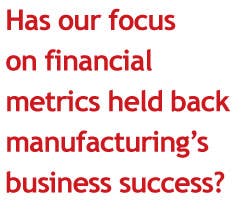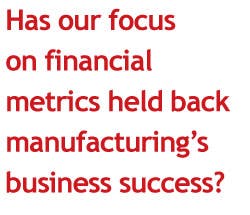The Manufacturer's Agenda: Did Finance Gut Manufacturing?
"If you have strategic sourcing reporting to finance, what do you get?
You get purchase price reduction. What else do you get?
Nothing.
You get purchase price [reduction] at all costs.
You don't get lead time, you don't get order quantity, you don't get on-time delivery and you don't get quality. You get purchase price reduction.
You get what you deserve."
-- Marty Thomas,
SVP Operations & Engineering
Services, Rockwell Automation
Such was the comment by a speaker at the 2014 IndustryWeek Best Plants Conference last month that jolted me. It confirmed for me that it is time to bring to the fore an issue that's lurked for some time in the back of my mind: Has our focus on financial metrics held back manufacturing's business success?
The idea that financial decisions can have (and have had) a negative impact on a manufacturing business isn't new, but it hasn't garnered the attention it deserves. Now -- and maybe it's just because I've started paying closer attention -- I'm starting to hear and read more about the role of finance in manufacturing strategy. And it's not positive.
Most recently, Suzanne Berger, an MIT professor and co-chair of the MIT Production in the Innovation Economy project, penned a no-holds-barred indictment, "How Finance Gutted Manufacturing." Published in the March/April issue of the Boston Review and online, she cites shareholders' forced break-up of Timken Co. into two separate companies as an example in which short-term financial concerns trumped long-term technology and product development considerations.
About the Author
Patricia Panchak
Patricia Panchak, Former Editor-in-Chief
Focus: Competitiveness & Public Policy
Call: 216-931-9252
Follow on Twitter: @PPanchakIW
In her commentary and reporting for IndustryWeek, Editor-in-Chief Patricia Panchak covers world-class manufacturing industry strategies, best practices and public policy issues that affect manufacturers’ competitiveness. She delivers news and analysis—and reports the trends--in tax, trade and labor policy; federal, state and local government agencies and programs; and judicial, executive and legislative actions. As well, she shares case studies about how manufacturing executives can capitalize on the latest best practices to cut costs, boost productivity and increase profits.
As editor, she directs the strategic development of all IW editorial products, including the magazine, IndustryWeek.com, research and information products, and executive conferences.
An award-winning editor, Panchak received the 2004 Jesse H. Neal Business Journalism Award for Signed Commentary and helped her staff earn the 2004 Neal Award for Subject-Related Series. She also has earned the American Business Media’s Midwest Award for Editorial Courage and Integrity.
Patricia holds bachelor’s degrees in Journalism and English from Bowling Green State University and a master’s degree in Journalism from Ohio University’s E.W. Scripps School of Journalism. She lives in Cleveland Hts., Ohio, with her family.



